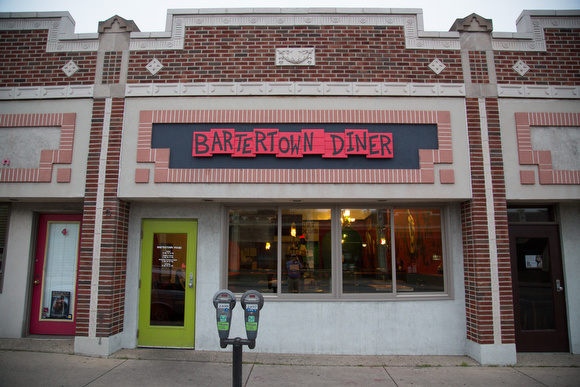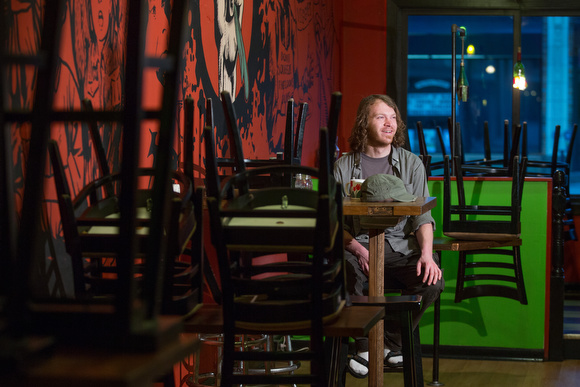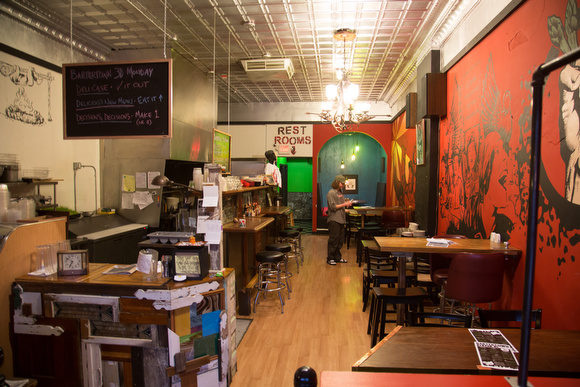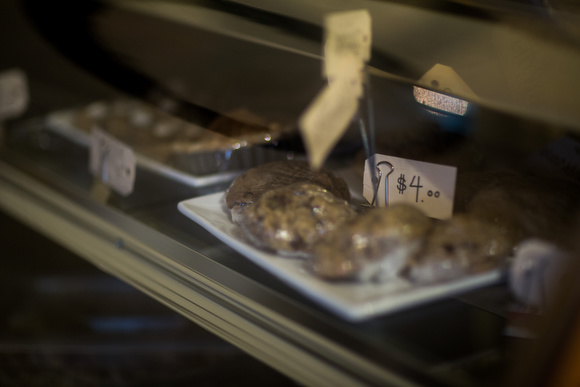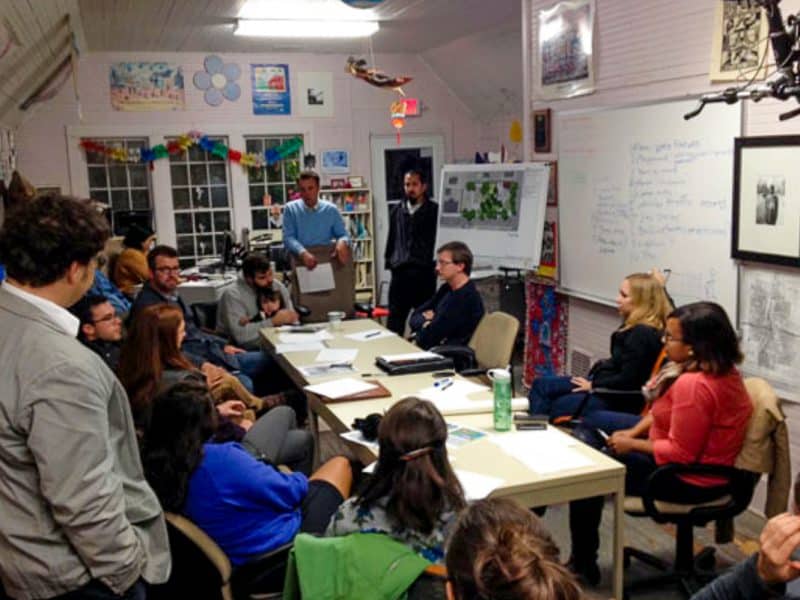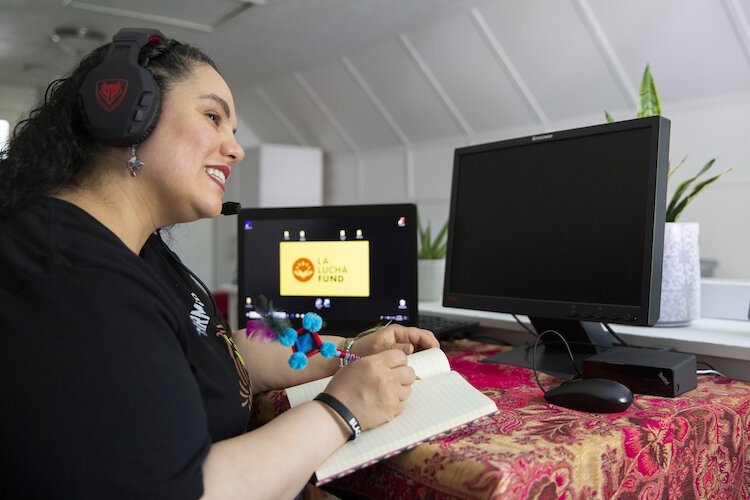Thought For Food: Revisiting Bartertown’s Unassuming Revolution
Last year, Bartertown Diner opened in downtown Grand Rapids as a worker-run vegan/vegetarian restaurant specializing in local, organic fare. Rapid Growth's Marie Lockerd stops by to see how they've grown and what they've accomplished in year one.
Catching up with Bartertown Diner‘s part owner and chef Ryan Cappalletti for an interview proved to be a bit difficult. Normally in the restaurant industry four in the afternoon on a weekday is a good time to find employees enjoying a lull in business before the dinner rush, but when I walked in at that time, it looked more like 7 p.m. on a Saturday. Although none of my questions got asked that day, the cheerfully busy atmosphere spoke volumes about how Grand Rapids has taken to the vegan/vegetarian employee-owned collective.
When Rapid Growth first reported on Bartertown’s opening, it was a three-person show comprised of Ryan Cappalletti, Roxanne Aguilar and John Bauer. They set out to offer fresh local fare in a restaurant where thought was put into the forces behind every aspect of their product and services. In the short 10 months since the diner’s opening at 6 Jefferson Street in downtown Grand Rapids, the collective has expanded to more than 10 members, all working with a common mentality and earning a living wage while they do it. This is a particular point of pride for the founders of Bartertown, who yearned for a departure from an industry that has increasingly overworked and underpaid the employees keeping it afloat.
“I think people don’t recognize it and they don’t want to recognize it, but it’s the modern day slave wage,” says Cappalletti. “Less than a hundred years ago, people fought and died for the 40-hour work week, which was so desperately needed. [Now] people need jobs, so the service industry is hiring them and taking advantage of the fact that they need work.”
Standing as advocates for the laborer doesn’t stop with its own members. This mentality is extended to the farmers that power the Bartertown cuisine. For Cappalletti, relying solely on locally grown product isn’t a trendy tag line, but a simple dollars and cents solution to Michigan’s struggling economy.
“Right now we live in a state that is constantly questioning what Michigan is going to do, how are we going to come out of this recession, how are we going to improve our cities, improve our schools — and I think that the obvious answer is to support Michigan,” he says. Ninety percent of the products that arrive at Bartertown’s tables are produced in this state, and the result for the customer is a fresh, creatively prepared meal that makes them feel good about indulging.
Such a simple and sensible idea prompts the question, “Why isn’t everyone doing business this way?” A common misconception is that buying locally necessitates increased cost to the business and subsequently to patrons, but according to Cappalletti, the question of whether to buy fresh food from local farmers or opt instead for frozen merchandise from a national corporation isn’t one of cost, but one of convenience. Buying from local farmers means that the food will be fresh, seasonal, and that yes, sometimes they will run out of things, an aspect of the business model that Bartertown has no intention of changing. Clearly, customers have neither felt inconvenienced or overcharged with a menu that rotates with the seasons and creative whims of the chefs. With five dollar plates, two dollar tacos and appropriately apportioned culinary creations offered every day, the eatery is living proof that offering local organic fodder doesn’t mean breaking the bank.
In the long list of higher ideals, Bartertown hasn’t forgotten about its responsibility to Mother Earth. These days, it seems that every company in America touts that they are “going green,” but most don’t question where those recycled to-go containers come from or what happens to the mounds of trash that they produce every night. What people may not realize is that up until recently, there hasn’t existed a truly clean, compostable, made in the U.S. product for take-away food containers. Materials travel all over the world to become the “green” recycled cup for your coffee, but the carbon footprint that all of this travel leaves behind defeats the purpose of its production. True to its vow to be conscious of what goes into all of the products in the building, Bartertown has located a North Dakota-based company called World Centric for all of their carry away needs. The company provides sustainable products of all kinds and powers all of their production with renewable energy, as well as donates profits to environmental groups, supporting the community.
As for what collective members call “bad trash,” or waste that is destined for the landfill, they produce only nine gallons of it every 30-40 days. That’s a fraction of the waste that most restaurants of its size produce in a single day. Instead of four or five industrial sized trash cans that get taken to the dumpster every evening, as is the case with most eateries, Bartertown’s “trash can” is a five-gallon bucket that is emptied as rarely as every 25 days.
Although these results are staggering, the concept is simple and is one which could be applied to every business in the city. The idea is to be aware. “What we do at Bartertown is try to think about where every single product in the building is made, where it comes from and how it’s manufactured because one of the primary points of Bartertown is that we’re all about the worker getting a living wage. If the worker who is making our to-go cup is not getting a living wage or if the farmers who are farming our olive oil are being treated unfairly, then the system’s not working,” says Cappalletti. “I want to teach people a better way to eat and a better way to live and, in a direct way, support our local economy.”
As business is quickly expanding, so are the collective’s plans for the future. Beginning in June, they will be partnering with Tree Huggers retail store on Wealthy Street in Grand Rapids to convert half of the shop into an all bulk, waste-free grocery store that will offer all of the produce you find on Bartertown’s menu. In tandem with this, the diner continues to provide free classes regularly to anyone who is interested, extending their knowledge of cooking with fresh, local produce, and taking field trips to Ham Family Farms, all in the name of spreading awareness of the role that food plays in our health, economy, community and enjoyment of life. At the end of the day, it’s all about a love of food, and realizing that at every step along the way, from the farm to your table, people can and should be treated fairly.
PHOTOS:
First photo: Bartertown is becoming more and more of a mainstay in the local food, local restaurant scene.
Second photo: Matthew Wroblewski, chef for Bartertown has come coffee before getting the restaurant ready.
Third photo: Bartertown opens for business
Fourth photo: Fresh produce and baked good are sold to people staying and takeout customers.
Photography by ADAM BIRD

